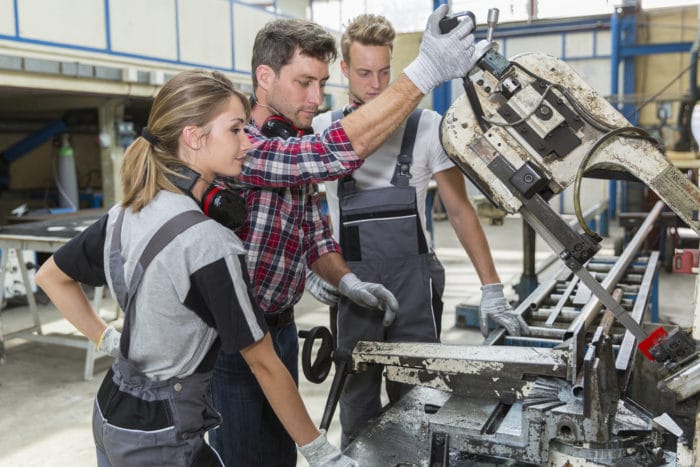Why We Love It
-
$94,690Potential Avg. Salary
-
1.2%Job Growth Rate
-
Growing DemandJob Outlook
-
Don't Take Work HomeCareer Attribute
A metallurgist is a metallurgical engineer that specializes in all kinds of metals and alloys, with a focus on developing and manufacturing different metal items.
Recommended Schools
What is a Metallurgist?
Duties
The following duties are undertaken by metallurgists:
- Oversee and approve inspection, testing, handling, packaging, storage, preservation, delivery, quality logs and statistical methods.
- Analyse any failures or issues with stock materials, finished parts and forgings which includes creating a plan for corrective action and implementation.
- Collaborate with team-members like maintenance and production departments to promote adherence to environmental and safety standards for plant operation and equipment quality.
- Train and give direction to technicians during quality inspection processes as per the heat treat operations manual.
- Support day to day activities related to metallurgical laboratory testing, including compiling daily or monthly metallurgical reports.
Day In The Life
As a metallurgist, you will spend your time doing work related to extracting and processing a wide range of metals. Your interest will involve assessing their quality and performance to gain insights on which ones can be utilized for industrial purposes.
Specific tasks through the day will vary depending on what your specialty is as a metallurgist. For instance, if you are a chemical metallurgist, you will be testing various ores to understand how best to recover metals from them. You would also monitor and record findings on the strength and quality of the metals. By contrast, if you are a physical metallurgist, you will be assessing how metals behave under stress and noting down the test results. As a process metallurgist, you may spend most of your time designing and shaping various metal parts which also involves processes like welding and soldering.
Work Schedule
Metallurgists working at industrial and manufacturing plants have to work on a shift basis. You might also have to work extra hours during peak demand time. However, individuals working in academia can enjoy more regular hours and work around 35-40 hours per week. Metallurgists can be working in various settings that can be a standard office environment, research laboratories, metal refineries and mine sites.
On occasion, you could be exposed to manufacturing areas where the use of protective equipment like safety glasses, helmets and work boots is encouraged, along with mandatory hearing protection. When required, a metallurgist must also be comfortable with working at heights or in confined areas to collect samples.
Growth Of The Job
If you prefer working in the industry as a metallurgist, you will eventually progress to more senior positions where you will coordinate and direct others, and superior technical skills are required. Experienced professionals in this industry also capitalize on opportunities specific to their focus area, like precious metals, stainless steel and non-ferrous alloys.
Progression in your career can happen quickly with the right professional qualifications and additional ways of utilizing metallurgical skills, such as doing independent consultations or advising clients. If you have an interest in leadership positions, you can take the path of a managerial role and end up as a production manager at an established manufacturing firm. Another alternative is to make a switch from industry to academia for a research-intensive position that expands on technical work.
Typical Employers
Employers of metallurgists are generally involved in the production and processing of metals. Typical organizations include metal refiners, miners, specialist metal producers, iron and steel casting foundries, research and development organizations, utilities companies, suppliers of energy and specialist consultancies in composite metals, government agencies, precious metals or powder coatings.
Recommended Schools
How To Become a Metallurgist
If you are interested in pursuing a career as a metallurgist, you must at least have a bachelor’s degree in a related discipline like physics, chemistry, chemical engineering, structural engineering, metallurgy, mineral science or engineering science. This type of role is a great choice for individuals that enjoy giving technical direction in a leadership position and excel at problem solving in a team setting.
Having previous work experience via internships or vacation placements can give you an advantage over other candidates and enhance your job prospects in this sector. In addition, on-the-job training is usually provided to entry-level candidate by the recruiting organisation, i.e. you will attend formal training workshops, a series of rotations and get first-hand experience under the supervision of a senior metallurgist. This is a great way to familiarise yourself with the day-to-day functions and understand how to maximise your professional qualifications to suit the demand.
Metallurgist Salary Data
We’ve provided you the following to learn more about this career. The salary and growth data on this page comes from recently published Bureau of Labor Statistics data while the recommendations and editorial content are based on our research.
National Anual Salary
Low Range
$69,530Average
$94,690High Range
$144,720National Hourly Wage
Low Range
$33/hrAverage
$46/hrHigh Range
$70/hrHow do Metallurgist salaries stack up to other jobs across the country? Based on the latest jobs data nationwide, Metallurgist's can make an average annual salary of $94,690, or $46 per hour. On the lower end, they can make $69,530 or $33 per hour, perhaps when just starting out or based on the state you live in.
Salary Rankings And Facts
#80 Nationally for All Careers
Above Average Salary Nationally
Highest Education Among Metallurgists
- 6.3% Doctorate
- 19.2% Masters
- 48.3% Bachelors
- 10.4% Associates
- 10.6% College
- 5.1% High School
- 0% Less than High School
Job Growth Projections and Forecast
2014 Total Jobs
25,3002024 Est. Jobs
25,600Job Growth Rate
1.2%Est. New Jobs
300How does Metallurgist job growth stack up to other jobs across the country? By 2024, there will be a change of 300 jobs for a total of 25,600 people employed in the career nationwide. This is a 1.2% change in growth over the next ten years, giving the career a growth rate nationwide of Above Average.
Growth Rankings And Facts
#573 Nationally for All Careers
Above Avg. Growth Nationally
What Companies Employ The Most Metallurgists
| Industry | Current Jobs | New Jobs Needed | % Increase |
|---|---|---|---|
| Aerospace product and parts manufacturing | 3,400 | 200 | 0% |
| Engineering services | 2,700 | 300 | 0% |
| Research and development in the physical, engineering, and life sciences | 2,000 | 300 | 0% |











